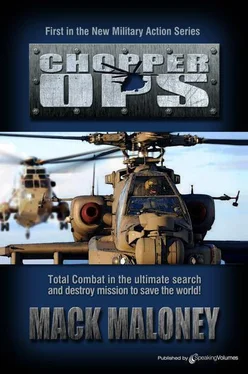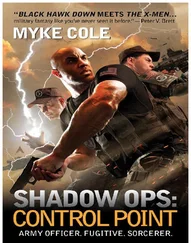Mack Maloney - Chopper Ops
Здесь есть возможность читать онлайн «Mack Maloney - Chopper Ops» весь текст электронной книги совершенно бесплатно (целиком полную версию без сокращений). В некоторых случаях можно слушать аудио, скачать через торрент в формате fb2 и присутствует краткое содержание. Город: Naples, FL, Год выпуска: 2011, ISBN: 2011, Издательство: Berkley, Жанр: Боевик, на английском языке. Описание произведения, (предисловие) а так же отзывы посетителей доступны на портале библиотеки ЛибКат.
- Название:Chopper Ops
- Автор:
- Издательство:Berkley
- Жанр:
- Год:2011
- Город:Naples, FL
- ISBN:978-1-61232-148-6
- Рейтинг книги:3 / 5. Голосов: 1
-
Избранное:Добавить в избранное
- Отзывы:
-
Ваша оценка:
- 60
- 1
- 2
- 3
- 4
- 5
Chopper Ops: краткое содержание, описание и аннотация
Предлагаем к чтению аннотацию, описание, краткое содержание или предисловие (зависит от того, что написал сам автор книги «Chopper Ops»). Если вы не нашли необходимую информацию о книге — напишите в комментариях, мы постараемся отыскать её.
Chopper Ops — читать онлайн бесплатно полную книгу (весь текст) целиком
Ниже представлен текст книги, разбитый по страницам. Система сохранения места последней прочитанной страницы, позволяет с удобством читать онлайн бесплатно книгу «Chopper Ops», без необходимости каждый раз заново искать на чём Вы остановились. Поставьте закладку, и сможете в любой момент перейти на страницу, на которой закончили чтение.
Интервал:
Закладка:
“And one more thing,” Zim called after him. “Thank my guest in Room 6.”
“I will, sir,” the man said, disappearing back out the door.
Once he was gone, Zim yawned, stretched his enormous body, and then put his head on a pillow and went to sleep. This was a normal ritual for him at about 9 A.M. every day.
Only when they heard him snoring did one of the Japanese girls retrieve the crumpled-up note and carry it over to the others who were waiting in the corner.
Quietly, they opened it and read it.
It contained only two words: They’re coming.
Major Ali Bus Qank was not really a major. Nor was he a military officer of any kind.
He was, however, the man in charge of Zim’s intelligence operation, and for this Zim had conferred the rank of “major” upon him arbitrarily. For all the work Qank wound up doing, he secretly believed he deserved to be given at least the faux rank of colonel—yet he would never tell Zim this.
Qank was a Syrian. He worked out of an office located beneath the west wall of Zim’s inner sanctum. From there Qank and a team of four collected intelligence from a variety of sources—newspapers, TV broadcasts, the Internet—as well as from the network of informants Zim had in place around the world.
This network was broken down into sectors known as Rings. Zim had organized the network himself many years before, and it was brilliant in its simplicity. The Third Ring was made up of freelance spies who had access to all airports, both commercial and military, as well as all major shipping ports stretching across southern Europe to the Middle East. Through simple observation, intercepted radio traffic, and purloined passage logs, the Third Ring knew just about every airplane and surface vessel, military or not, that moved from America through Europe to the Middle East.
Of the entire network, the Third Ring was the most reliable at revealing the American military’s objectives. Like Zim, Qank knew some things about the Americans. First, they always entered military action reluctantly. Yet when they made their minds up to act, they usually acted quickly. Too quickly, most times, especially when it came to secret operations.
That was what Qank knew Zim was now anticipating. The sinking of the USS LaSallette had been a big mistake. But mistakes happen. The destruction of the Qak-Six oil rig had been a job, paid for by a rival oil consortium, just one of dozens Zim had contracted for the gunship in the past year and a half. That the star-crossed American ship had happened upon the scene was something that could not have been prevented. And actually, there had been some luck in this. Because the LaSallette was a spy ship, there had been nothing heard about its sinking—not in the media, not in the back channels. Not yet anyway. Qank knew the Americans would want to keep quiet for now about the ship’s sinking, rather than admit what it was up to at the time of its demise.
But Qank also knew the Americans could not let the sinking go unpunished. Refugee camps, food convoys, Bosnian innocents—their liquidation had registered little on America’s moral radar. But the sinking of the LaSallette had changed that. Some of their own had been killed—by a weapon they had lost control of many years before. And now the Americans were coming to get that weapon back. Finally.
Qank and Zim had discussed this eventuality before, of course. In their scenario, they expected at least a thousand American troops, probably special forces of some kind, to transit to the Persian Gulf area, probably offloading in Bahrain or in the United Arab Emigrates, but definitely not in Saudi Arabia or Kuwait. The prepositioning of this force would likely be accompanied by the appearance of an aircraft carrier or two moving into the upper Gulf area. Then all U.S. forces in the area would be put on alert—and then the Americans would strike.
The only question was, when?
That was where the Third Ring came in. If anyone could identify the means of transport and the timetable of the oncoming American force, the freelance spies in the Third Ring could.
So Qank worked his secure phones for the rest of this day and far into the night. Giving orders to his informants and getting back their reports, he spoke to more than 150 individuals in eighteen hours. If a thousand special troops were moving to the Persian Gulf area by air, Zim’s spies would have detected a small parade of C-5 or C-17 cargo planes making their way across the Atlantic. These planes might land at Rota, Spain, or on Sardinia. (Nonstop transits were not common, if only to preserve the crews and prevent suspicion.) If such a force was moving by ship, the spies would likely see a fast-assault vessel or even a nuclear-powered aircraft carrier suddenly make an appearance in their region.
The Middle East was like a sieve. Very few things happened that weren’t spoken about somewhere by someone. Qank was sure that the American troops coming to get the gunship would show up somewhere. But after a long day on the phone, he was left with an odd fact: None of the Third Ring spies had seen anything. It was business as usual at all their locations. No extraordinary activity at American air bases, no aerial tankers taking off in unusual sequences, no areas cordoned off for classified flights. Nothing.
The ring reported no unusual shipping activity either. No assault ships had been spotted, no vessel at all that might be carrying the size of the force Qank and Zim were expecting. In fact, there was little U.S. military shipping happening anywhere at all. This was very strange.
A bit desperate, Qank commenced scouring the Internet, searching the web pages of all the major U.S. newspapers on the East Coast. He was looking for any stories that would have indicated a small specialized military unit moving out, farewell celebrations at a military port or at an air base—that sort of thing. But this turned up nothing as well. He had one of his men do the same thing for all newspapers in the U.K., Italy, and Germany—perhaps the Americans were moving troops down from Europe to do the job. But this proved a dead end too.
Finally, he had his men check their informants in place in the handful of American bases in the Persian Gulf itself. Maybe some specialized troops already in the region would be called on to retrieve the gunship. But again, there was nothing to indicate that was taking place.
After thirty-six straight hours of this, Qank was stumped. If something was happening, the Third Ring would have sniffed it out simply because when it came to covert military operations, the Americans were not very good at sneaking in the back door.
Yet the man in Room 6 said they were coming.
So, where were they?
Chapter 17
Delaney was sick. Very sick.
Possibly sicker than he’d ever been.
He’d been riding the rail of the freighter for days, watching as waves that appeared to be the size of skyscrapers rose and fell before him. He’d lost all track of time, didn’t know what day it was, or even what body of water he was on. All he knew was that he’d thrown up so many times he couldn’t believe his stomach could hold any more.
It was embarrassing. Of the entire unit, he was the only one who was still expelling bits of food he’d eaten weeks ago. He’d tried all sorts of things to stop. Holding his breath. Drinking warm water. He had even tried prayer. Nothing worked. He felt as if he’d been throwing up his entire life.
And that was a shame, because this trip had started off so differently.
Upon leaving Seven Ghosts Key, the unit, contained in three C-5’s—men, choppers, and all—had flown to an even more exotic location: a place called Xetu on the outer Canary Islands. The C-5’s set down at a large privately run airport on the island’s secluded northern end. Because the unit had not been briefed about the details of their transit, everyone just assumed that the C-5’s were simply refueling there, and would leave as soon as the gas-up was complete.
Читать дальшеИнтервал:
Закладка:
Похожие книги на «Chopper Ops»
Представляем Вашему вниманию похожие книги на «Chopper Ops» списком для выбора. Мы отобрали схожую по названию и смыслу литературу в надежде предоставить читателям больше вариантов отыскать новые, интересные, ещё непрочитанные произведения.
Обсуждение, отзывы о книге «Chopper Ops» и просто собственные мнения читателей. Оставьте ваши комментарии, напишите, что Вы думаете о произведении, его смысле или главных героях. Укажите что конкретно понравилось, а что нет, и почему Вы так считаете.












